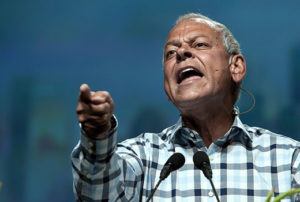
ORLANDO, Fla. (BP)–In adopting the report of the Baptist Faith and Message Study Committee, Southern Baptists embraced biblical authority and rejected a theology that divides Christ and the Bible one from another.
That was the conviction expressed by four committee members who held a news conference June 14 after an overwhelming vote to approve the committee’s proposed revision of the Baptist statement of beliefs.
During floor debate, a few messengers criticized the committee’s decision to omit a sentence from the 1963 BFM, which read, “The criterion by which the Bible is to be interpreted is Jesus Christ.”
But this sentence has been widely abused during the past few decades by biblical interpreters who, for example, “put Jesus in opposition to the apostle Paul [and] their own personal understanding of Jesus over against the teaching of Scripture,” said Richard Land, president of the Southern Baptist Ethics & Religious Liberty Commission.
R. Albert Mohler Jr., president of Southern Baptist Theological Seminary, Louisville, Ky., said the floor debate illustrated the contrast between two viewpoints among Southern Baptists.
“What you saw demonstrated is that there are two different visions of Baptist life. … I am thankful that we have said we are not going to set Christ against Scripture. We have confessed that all Scripture is a testimony to Christ,” Mohler said.
Another seminary president and committee member made similar observations, decrying troubling theological trends that began in the 1960s.
During the debate, “we had some magnificent textbook illustrations of why we ever had an internal struggle and of the deep differences that there are — and of the great significances of some of those differences,” said Chuck Kelley, president of New Orleans Baptist Theological Seminary.
Adrian Rogers, the committee’s chairman and pastor of the suburban-Memphis Bellevue Baptist Church, Cordova, Tenn., suggested the vote represented an embrace of Jesus and the Bible.
“We have said one more time as Baptists that we believe the Bible and we want to live by the Bible,” Rogers said. “We love Jesus Christ passionately and devotedly. But the Jesus we love is the Jesus of the Bible — not the Jesus of imagination, subjectivity or personal revelation. That really is the watershed.”
Speaking to a roomful of reporters, mostly from secular media organizations, Rogers explained a distinction between Jesus and Scripture.
“The Bible and Jesus are not absolutely synonymous, but they are certainly inseparable,” Rogers said. “The written word [the Bible] honors the living word [Jesus]. There are those who like to drive a wedge and put human autonomy and subjectivity over above the authority and inerrancy of the Word of God.”
Committee members cautioned the press against misunderstanding Baptist polity, noting that the convention’s vote is not binding on local churches.
“We don’t have the right, the authority or the power to limit anybody,” Rogers noted. “We would resist that. What we are stating is what we believe mainstream Baptists believe. … It is not a creed. It is a statement of what most of us believe.”
Other media questions focused on the new BFM’s stance against women serving as senior pastors.
“We would never presume to tell another church whom they may call as a pastor or tell another person whether or not they may serve as pastor,” Mohler said. “We’re not trying to force our beliefs on someone else.”
Asked by a reporter whether the committee had been concerned that Baptists would split over the gender issue, Rogers replied quickly.
“No, not even a splinter,” he said. “The proof of that is that out of 42,000 some odd Baptist churches … less than 1/10 of 1 percent have a female for pastor — somewhere between 50 and 70 in the entire convention. That would not portend any kind of a split at all.”
Land said Southern Baptists largely agree on the matter. “It’s one reason so many moderate churches, who want to plead for women in ministry, don’t have women pastors. They can’t get their own churches to call a woman as pastor. That’s how popular it is among Southern Baptist rank and file.”
But Land added, “We are not in any way, shape or form saying that women are in any way, shape or form inferior to men.”
Rogers was asked whether he would support exclusion from the Southern Baptist Convention of a church that called a woman as pastor.
“I’m not going to talk about a situation that is not delineated,” Rogers responded. “We would find out what the situation is and vote. I would certainly always vote for my understanding of the practice of the Bible.”
While churches may accept or reject the newly revised confession, SBC entities have long expected their employees to affirm the previous BFM statement, committee members said.
“This statement is a regulative document for use by the agencies and institutions and seminaries of the denomination,” Mohler said. “The convention has said, ‘This is what we believe, and we expect those who will serve our agencies to believe this.’ … The individual boards of trustees have taken that action as a matter of accountability and faithfulness with the convention.”
At Southern Seminary, Mohler said, that means affirmation of the BFM “in whatever form currently adopted by the Southern Baptist Convention.”
Yet the expectation that agency employees should affirm the BFM does not represent coercion, Mohler stated.
“No one is obligated to accept employment in one of the institutions of the convention,” he said. “That’s a voluntary act — and to accept employment is to accept the terms of employment.”
Committee members also answered questions about why they proposed on June 14 adding language to their original recommendation, explicitly affirming the priesthood of the believer and soul competency.
“We issued the report nearly a month before the convention and wanted the feedback of Southern Baptists,” Land said. “It became clear to us that there were significant numbers of Southern Baptists … who were concerned that we further emphasize and underscore and make certain” the doctrines were affirmed.
Properly understood, Mohler commented, soul competency means that one “does not need any other human intermediary or mediator. We have only one high priest, and that is Jesus Christ our Lord. … We have direct access through Jesus Christ to God the Father.”
Mohler rejected the idea that “every man or woman stands absolutely on his own. … Baptists believe in the priesthood of believers, but it is dangerous to say the priesthood of the believer.” Emphasizing the difference between the singular and plural, Mohler continued, “It is not just that we stand alone; it is that we stand together — and we stand together under the authority of God’s Word.”
Rogers said the committee wants “conciliation — always. … It’s better to be divided by truth than united by error, but we want peace as much as possible.”














